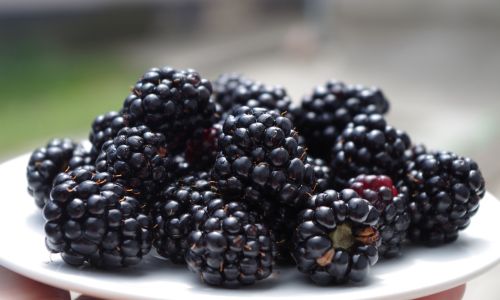Calhoun County, AL – Blackberries can be a great crop for the home garden or for a commercial farmer. Many different types of blackberry plants are available, and I would spend a little time studying the different cultivars before I decide which blackberry to plant. Before I discuss different cultivars, I want to mention a few things about the planting location. In addition to being planted in the full sun and having good internal drainage, we need to think about the plant location with regards to winter injury. It is very common for blackberries to start blooming before the danger of frost is over. Plantings on slopes or top of slopes will allow cold air to drain away from the plants on cold nights. Blackberries planted on a southern slope may bloom earlier than those planted on a northern slope. I usually like the plants to bloom as late as possible, but some years the northern slope will hurt you and sometimes it will help. The main thing is to avoid low-lying areas if possible. Cold air settles in low areas, and those are the plantings that will be affected most by cold injury during bloom. Trees growing around the field can hold in the cold temperatures. A grower might be able to do something about some of these issues, but freezing temperatures during blooming is always a concern.
The blackberry cultivars can be erect, semi-erect, or trailing. The trailing and semi-erect plants would require a trellis, and the erect plants may or may not need a trellis. A common management practice is to plant trailing, semi-erect, and erect plants on a trellis. The next step is to decide between thorny or thornless plants. That seems like an easy decision as most would choose the thornless plants. However, the thorny plants offer an aggressive growth habit, more disease resistance, and therefore can be very productive. Cultivars are available that have large fruit on both thorny and thornless plants, and early or later ripening cultivars are available as well. Some popular thorny, erect cultivars include, ‘Chickasaw’, ‘Choctaw’, ‘Kiowa’, and ‘Shawnee’. Some popular thornless, erect cultivars include, ‘Apache’, ‘Arapaho’, ‘Navaho’, ‘Osage’, and ‘Ouachita’. Thornless cultivars in the semi-erect category include ‘Chester’, ‘Natchez’, ‘Sweetie Pie’, and ‘Triple Crown’.
There can be a big difference in the fruit size and production of some of these cultivars. It may depend on the use of the berry as to what cultivar to choose. There are some relatively new types of blackberries available called primocane fruiting blackberries. The primocane fruiting blackberries will produce a crop on the floricanes, but will also produce on the first year primocanes. The summer heat will reduce the fruit quality, and these should only be planted on a small scale.
Primocane fruiting blackberries that could be planted on a trial basis include ‘Prime-Ark 45’, ‘Prime-Ark Freedom’, and ‘Prime-Ark Traveler’. All of these are erect types, and of these, ‘Prime-Ark Freedom’ and ‘Prime-Ark Traveler’ are thornless.
We have a publication titled “Commercial Production Guide – Blackberry & Raspberry” that can be found on our website that is filled with production information. If you have any questions on blackberry production, give us a call at your local Extension office.
Dr. Chip East is with the Alabama Cooperative Extension System and is a contributing writer.






